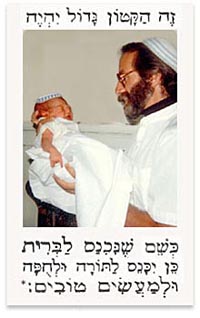|


The religious
life of the Jew begins on the eighth day of his birth. Since the circumcision
is performed on each individual at that age and is not, as it is frequently
elsewhere, a ritual practiced collectively, it underscores the singularity
of each Jew's relationship to God, his personal dedication and obligation
as a member of a covenanted community. It is the distinguishing mark of
Jewish identity and, more than anything else, has proved to be a powerfully
cohesive force in the struggle for national survival.
 The
history of the observance of the institution among Jews is interwoven
with that of the Jewish people itself. In the heyday of Hellenism some
Jews tried artificially to efface the signs of circumcision by means of
epispasm, that is, by having the prepuce drawn forward to cover up the
corona.[1]
But when the Seleucid monarch Antiochus IV Epiphanes proscribed circumcision
in 167 B.C.E., Jewish mothers suffered martyrdom for deliberately violating
the royal decree.[2]
This kind of resistance was the first sign of the rebellion that culminated
in the Maccabean revolt. The
history of the observance of the institution among Jews is interwoven
with that of the Jewish people itself. In the heyday of Hellenism some
Jews tried artificially to efface the signs of circumcision by means of
epispasm, that is, by having the prepuce drawn forward to cover up the
corona.[1]
But when the Seleucid monarch Antiochus IV Epiphanes proscribed circumcision
in 167 B.C.E., Jewish mothers suffered martyrdom for deliberately violating
the royal decree.[2]
This kind of resistance was the first sign of the rebellion that culminated
in the Maccabean revolt.
When
the Roman emperor Hadrian (ca. 130 C.E.) made circumcision a capital crime,
this became one of the main causes of the Bar Kokhba insurrection (132-135
CE). Throughout the ages Jews clung tenaciously to the practice in defiance
of ridicule and persecution on the part of Christian authorities and in
the full consciousness of its vital role in Jewish self-preservation.
It is important to note, however, that circumcision is not a sacrament
in the Christian sense of the term but an indispensable obligation of
Jewish law, since one born of a Jewish mother is automatically Jewish.
It is the status of the mother, not the act of circumcision, that determines
the infant's religious character as a Jew.
The primary
responsibility for circumcision devolves upon the father. Since the average
Jew is unable to perform the operation in accordance with the requirements
of Jewish law, he commissions a trained mohel to act on his behalf.
The mohel is selected not solely for his skill and learning but also for
his piety. Similarly, the sandek (from the Greek synteknos,
"godfather"), who has the privilege of holding the babe on his
knees during the operation, is expected to be a God-fearing man.
The proper
time for fulfilling the mitzvah is as soon as possible after sunrise
on the eighth day after birth, even if it is a Sabbath or holy day. Should
the birth take place just before sunset, that day is still regarded as
one complete day. If, however, the child is born in the twilight period,
rabbinic authority must be sought as to the correct time for performing
circumcision. If circumcision has been postponed for medical reasons,
it may not subsequently be carried out on a Sabbath or holy day. Once
postponed, it is also not performed on a Thursday because this might lead
unnecessarily to profanation of the Sabbath, which would be the third
day after circumcision, when the pain is thought to be most intense and
some special treatment might be called for.
The actual
rabbinic procedure consists of three parts. First comes the surgical removal
of the foreskin with a knife (hittukh, milah). Then the
inner lining of the prepuce is firmly held between the thumbnail and index
finger of each hand, is torn down as far as the corona, and then rolled
back completely to expose the glans and the corona (peri'ah). After
this, blood is sucked from the wound as a means of disinfection, a rite
now often performed with the aid of a swab or glass tube (metsitsah).
From early times,
the terms for uncircumcision and circumcision came to be used figuratively.
A mind blocked to God's commandments has been described as "an uncircumcised
heart,"[3]
a heart that required "circumcising;"[4]
one unreceptive to God's word as having "an uncircumcised ear;"[5]
one impeded in his speech as having "uncircumcised lips"[6].
All these metaphors prove conclusively that circumcision in Israel was
no mere formal outward ritual but was invested with a spiritual aspect
that betokened dedication and commitment to God.
|



